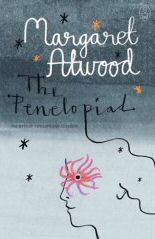
Margaret Atwood, The Penelopiad
For about the past forty years or so there has quietly developed a whole subgenre of literature that offers a "retelling" of an established literary work, but from the point of view of one of the minor characters. Tom Stoppard's Rosencrantz and Guildenstern are Dead and Jean Rhys's Wide Sargasso Sea are good early examples of this genre, "retelling" Hamlet and Jane Eyre, respectively. This genre also describes the entire Gregory Maguire ouvre.
Which is one of the reasons why I feel somewhat disappointed by Atwood's latest novel, The Penelopiad. While I had hoped she'd give the Stoppard and Rhys treatment to the character of Penelope and the events of Homer's Odyssey, I was disappointed to find a novel that, well ... doesn't say much that I hadn't already heard before. Its "story" adheres closely to the Homeric epic for obvious reasons, but the voice of Penelope -- who laments her inferior position within the household, and comments on how little credit she is given in the "official" mythic accounts -- merely echoes that of Elpheba from Wicked (the catty competitiveness between Penelope and Helen even parallels that of Elpheba and Glinda). And having read Atwood's The Handmaid's Tale years ago (which I think is a masterpiece), Penelope doesn't seem to "say" much about man/woman relationships and society's perceptions of those relationships that hasn't been said already.
What I did enjoy about the book was the conversational approach Atwood took to giving the stories of the ancient Greek underworld and the myths, maintaining the spirit of the oral tradition from which all of these myths derive. Penelope peppers her narrative with countless sidebars involving characters we all know from Greek mythology, and these serve to season the narrative nicely with fresh qualities that a simple rehashing of The Odyssey wouldn't. All told, I was more interested in her observations of the underworld than her trite feminism and obvious characterization of a teenaged Telemachus.
Bottom line: Methinks Maguire's Wicked covered the same ground and did so more entertainingly and profoundly.
No comments:
Post a Comment